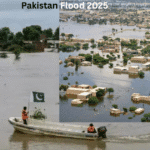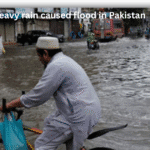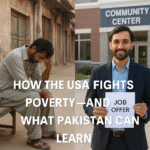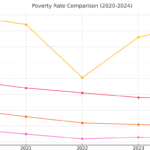When we talk about poverty in Pakistan, we usually point fingers at the economy, corruption, or bad leadership. And yes, those things matter. But here’s what I’ve learned living in the USA: poverty isn’t just about money—it’s about broken systems.
In America, even if someone’s struggling, there are systems in place to help them stay on their feet. In Pakistan, over 42% of people live below the poverty line according to word abnk report That’s a huge number. It hurts to see, but I truly believe things can get better, I’m not an expert who can give you an economic roadmap, but I do want to share what I’ve seen with my own eyes. Living here, I’ve noticed how the system really helps people get back on their feet when they’re going through financial trouble. If we fix the way our systems work.
In the United States, poverty also exists. But the system is designed to prevent people from falling too far. I’ve lived here long enough to see it in action, and I want to share how it works, so maybe, just maybe, we can apply some of these ideas back home in Pakistan.
👨🏢 Safety Nets That Actually Work
In America, when you lose a job, you don’t lose everything.
You get unemployment benefits—money in your account every week while you look for work. You also receive free access to job training programs, and your children continue to attend school without interruption. If you’re low-income, the government steps in with food stamps (SNAP), Medicaid (free health coverage), and housing assistance.
These aren’t handouts. They’re lifelines.
🚑 Healthcare Is a Right for the Poor
If you’re poor in America, you don’t avoid hospitals because you can’t afford them. Medicaid covers low-income families, kids, and the elderly. During COVID, millions got tested and treated for free. Compare this to Pakistan, where a hospital visit can wipe out a family’s savings.
🏢 Local Governments That Compete to Help People
One thing that shocked me: In the U.S., local mayors compete to attract residents and businesses. How? By making their cities cleaner, safer, and better to live in. Better services mean more people move in—and more tax dollars come in.
It’s a positive cycle.
Now think of our local governments in Pakistan. Do they compete to improve roads, schools, or hospitals? Or are they waiting for orders from Islamabad?
💰 Direct Cash, Not Middlemen
One of the smartest tools America uses: direct cash transfers. When COVID hit, every household got up to $5,000—directly in their bank accounts. No long lines. No safarish. No corruption.
If we talk about corruption in Pakistan, many of you might remember the 2005 earthquake in Pakistan. The aid that came from outside, meant for the people who were affected, started showing up in markets almost immediately, being sold for profit.This is the harsh reality.
Until we, as a nation, stand up and say no to corruption, poverty will keep being part of our destiny. It’s not just the system that needs to change—we all need to change too.
Pakistan tried something good or similar with the Ehsaas Program/ or BISP , and it worked. But instead of building on it, we let politics kill it.
🏦 Education and Skills Matter
In the U.S., you don’t have to be rich to go to college. If you’re low-income, you can get free community college or financial aid. There are job-training centers in almost every city. They teach welding, coding, nursing—real-world skills that get people hired fast.
Imagine if Pakistan invested like this in youth—especially in rural areas.
⚡ What Can Pakistan Do?
We don’t need to copy the USA. We need to learn from what works. Here’s what we should do:
Bring back and strengthen Ehsaas-type programs.
Invest in real skills training, not just degrees.
Make healthcare free for the poor.
Let local governments lead—with power and accountability.
Use technology to send aid directly, cut out middlemen.
🙏 Final Thoughts
Poverty is not just about money. It’s about systems that fail people. I’ve seen how the U.S. catches its people before they fall. It’s not perfect, but it works.
Pakistan doesn’t need more charity. It needs better systems. Let’s stop just talking











very true. it is a different way of seeing things.
Thank you for your thoughtful comment! I appreciate it.